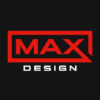
Oct 02 — 2025
SHARE POST
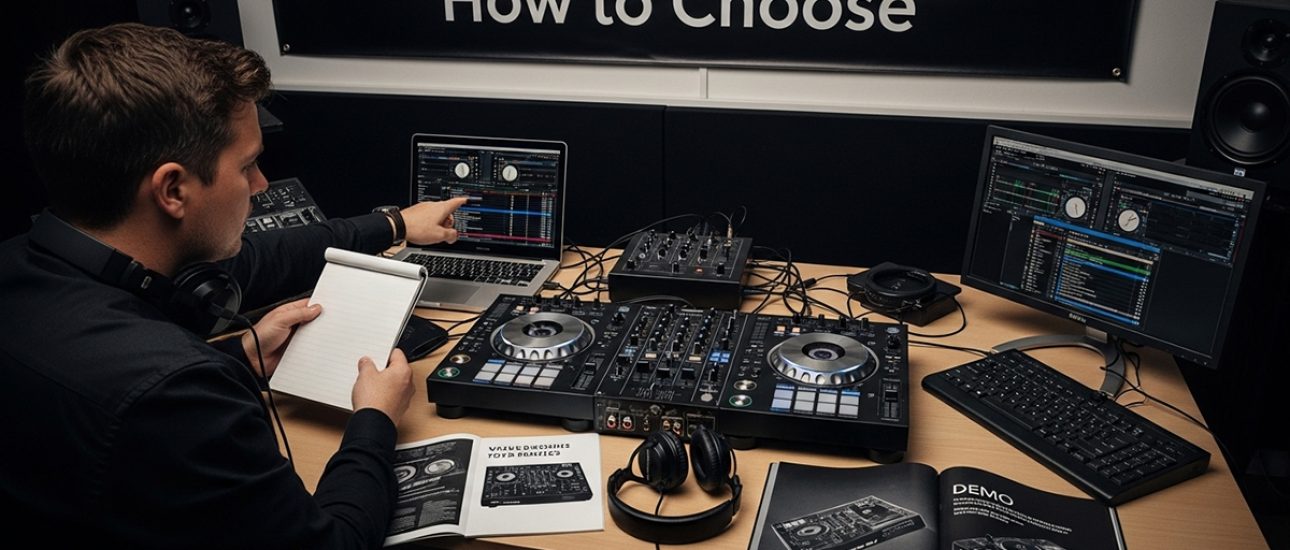
Table of Contents
TogglePicking the perfect DJ console can feel overwhelming when options range from compact controllers to full-blown professional rigs. Some models run as low as $500 while top-tier setups soar to $5000 or more. You might think that the most expensive decks are always the answer. The truth is, finding the right console is more about matching your style, skills, and performance goals than chasing the highest price tag.
Choosing the right DJ console begins with a critical self-assessment of your unique performance requirements and professional objectives. This initial step establishes the foundation for finding a console that not only meets your technical needs but also supports your artistic vision and career trajectory.
Understanding your specific performance environment is crucial when selecting a DJ console. Professional event DJs working in large venues will have different equipment needs compared to bedroom producers or mobile DJs who require portable setups. Consider the scale and type of events you typically manage: Are you performing at wedding receptions, nightclubs, corporate events, or creating studio mixes? Each scenario demands distinct features from your DJ console.
Your musical genre and performance style significantly influence console selection. Electronic dance music (EDM) performers might prioritize consoles with robust effects and sampling capabilities, while hip hop DJs could focus on scratch-friendly platters and precise pitch control. Techno and house DJs often seek consoles with expansive loop and remix functionalities.
Budget represents another fundamental consideration. Professional consoles range from $500 to $5000, with entry-level models suitable for beginners and advanced units designed for seasoned performers. According to Musicians Institute, matching your investment to your skill level and professional aspirations prevents unnecessary financial strain.
Additionally, assess your technical proficiency and willingness to learn complex systems. Some modern DJ consoles offer intuitive interfaces perfect for newcomers, while others provide deep customization for experienced professionals. Determine whether you prefer plug-and-play functionality or desire granular control over every aspect of your performance.
Key verification criteria for successfully completing this assessment include:
By meticulously evaluating these factors, you create a strategic roadmap for selecting a DJ console that transforms your musical aspirations into tangible performance capabilities.
Below is a checklist table to help you verify your needs and goals before moving forward in choosing a DJ console.
| Verification Criteria | Description |
|---|---|
| Performance Environment | Identify primary spaces where you will DJ (clubs, weddings, studio, mobile events) |
| Musical Genre & Style | Determine genres and performance techniques that influence your console requirements |
| Budget Range | Establish your investment range, aligning with skill level and career goals |
| Technical Skill Level | Assess your experience and desire to learn complex vs. simple systems |
| Professional Goals | Define your short- and long-term objectives for using the DJ console |

Researching DJ console options transforms your preliminary assessment into actionable knowledge. This critical step involves comprehensive exploration of available technologies, brands, and models that align with your professional requirements and creative vision.
Begin your research by mapping the landscape of modern DJ consoles. Digital controllers, analog mixers, and hybrid systems represent the primary categories, each offering unique advantages. Professional DJs typically navigate between two primary console types: standalone digital controllers and modular systems that integrate software and hardware components.
Understanding contemporary console configurations requires systematic investigation. Digital controllers like the Max DJ Console L+ provide integrated solutions with built-in sound cards, performance pads, and comprehensive software compatibility. These units offer plug-and-play convenience for performers seeking streamlined setups.
According to Musicians Institute, modern DJ consoles vary dramatically in complexity and feature sets. Entry-level models typically include basic mixing capabilities, while professional units offer advanced loop functions, multiple channel management, and sophisticated effects processing. Your research should focus on matching console complexity with your skill level and performance requirements.
Navigate your research through multiple channels: professional equipment review websites, DJ forums, YouTube demonstrations, and manufacturer specifications. Pay particular attention to:
Consider consulting professional DJ communities and attending equipment demonstrations to gain hands-on insights. Many music stores offer trial periods or demonstration sessions, allowing you to experience potential consoles in controlled environments.
Successful research completion involves developing a shortlist of 3-5 console models that comprehensively match your identified needs. This curated selection becomes the foundation for more detailed comparative analysis in subsequent decision-making stages.
The following table compares the three main types of DJ console configurations mentioned in the article, highlighting their core characteristics, ideal user type, and unique features.
| Console Type | Core Characteristics | Ideal User | Unique Features |
|---|---|---|---|
| Digital Controller | Integrated sound card, software-based | Beginners, mobile DJs, streamlined | Plug-and-play, portability |
| Analog Mixer | Hardware mixing, tactile controls | Purists, club DJs, traditionalists | Classic feel, robust build |
| Hybrid System | Mix of analog hardware & software | Versatile, tech-savvy performers | Advanced effects, deep integration |
Comparing DJ console features and specifications transforms your research into a strategic decision-making process. This crucial step requires methodical analysis of technical capabilities, ensuring your chosen console aligns perfectly with your performance requirements and professional ambitions.
Technical specifications form the backbone of your comparison, demanding careful examination of each potential console’s core capabilities. Focus on critical elements that directly impact performance quality, including channel count, connectivity options, audio resolution, and integrated software compatibility.
Create a comprehensive comparison matrix that evaluates each potential console across multiple dimensions. Signal-to-noise ratio, input/output configurations, and signal processing capabilities represent fundamental technical indicators of console quality. Pay close attention to latency performance, as milliseconds can dramatically impact live mixing precision.
Software integration represents another pivotal comparison criterion. Modern DJ consoles increasingly rely on sophisticated digital interfaces, making seamless software compatibility absolutely essential. Explore the Max DJ Console XL as an example of how professional-grade equipment integrates advanced software capabilities with robust hardware design.
According to Musicians Institute, professional DJs should evaluate consoles across several critical performance metrics:
Beyond technical specifications, consider the ergonomic aspects of each console. Physical design impacts performance comfort and stage presence. Evaluate factors like control layout, fader sensitivity, knob responsiveness, and overall weight distribution. Some DJs prefer compact, lightweight controllers for mobile performances, while others prioritize expansive control surfaces.
Financial considerations should complement your technical comparison. Calculate the total cost of ownership, including potential software subscriptions, additional accessories, and long-term maintenance requirements. A seemingly affordable console might incur significant hidden expenses through proprietary software or limited upgrade paths.
Successful specification comparison culminates in a ranked shortlist of consoles that comprehensively meet your technical, creative, and budgetary requirements.
This strategic approach transforms complex technical evaluation into a clear, actionable selection process.
Testing a DJ console for usability and performance represents the most critical phase of your selection process. This hands-on evaluation transforms theoretical specifications into real-world performance insights, ensuring the console genuinely meets your creative and technical requirements.
Practical testing goes beyond theoretical specifications, demanding immersive interaction with potential equipment. Schedule dedicated demonstration sessions at professional music stores, audio equipment retailers, or industry trade shows. These environments provide controlled settings where you can thoroughly assess console capabilities under professional guidance.
Begin your testing protocol by simulating your actual performance scenarios. For mobile DJs, this means evaluating portability and quick setup capabilities. Studio-based performers should focus on intricate software integration and sound manipulation features. Recreate your typical performance environment as closely as possible to generate authentic performance insights.
Critical testing parameters involve assessing interface responsiveness, tactile feedback, and overall ergonomic design. Pay attention to how naturally control surfaces respond to your touch, examining fader smoothness, knob precision, and performance pad sensitivity. Explore the DJ Console Laptop Stand as a complementary accessory that can enhance your testing and performance setup.
According to Musicians Institute, professional DJs should evaluate consoles across multiple performance dimensions:
Mental workload represents another crucial testing parameter. A well-designed console should feel intuitive, reducing cognitive strain during complex mixing sequences. Observe how quickly you adapt to the console’s layout, noting the learning curve and muscle memory development required for seamless operation.
Document your testing experiences meticulously. Create a structured evaluation sheet recording objective measurements and subjective impressions. Note specific moments of friction or exceptional performance, comparing these insights against your original performance requirements.
Successful console testing culminates in a clear understanding of how the equipment integrates with your unique performance style. The ideal console should feel like a natural extension of your creative process, offering intuitive control while providing robust technical capabilities.
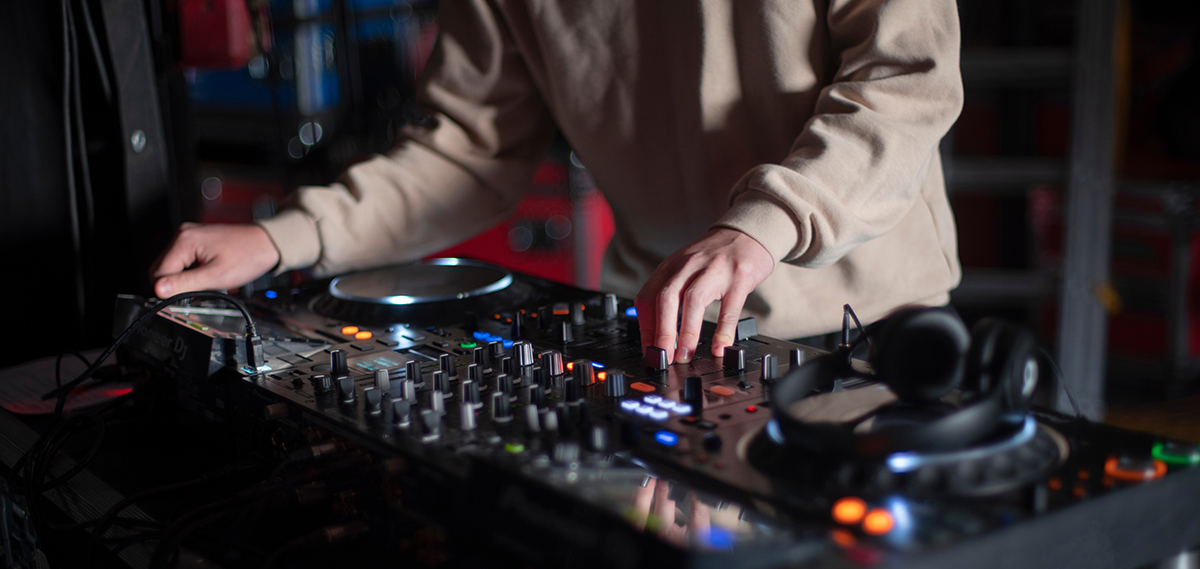
Finalizing your DJ console purchase represents the culmination of a strategic, methodical selection process. This critical step transforms your comprehensive research and testing into a definitive investment in your professional equipment arsenal.
Financial considerations play a pivotal role in your final decision. Compare pricing across multiple authorized retailers, examining not just the upfront cost but the total value proposition. Consider warranty coverage, included accessories, and potential software bundling that might provide additional value beyond the console’s base price.
Carefully review the return and exchange policies of potential sellers. Professional-grade DJ equipment represents a significant investment, so understanding your options for potential returns or exchanges becomes crucial. Some retailers offer extended testing periods or performance guarantees that can provide additional purchasing confidence.
Before completing your purchase, verify comprehensive compatibility with your existing performance ecosystem. Ensure the console integrates seamlessly with your current software, computer systems, and supplementary audio equipment. Explore the Max DJ Console L+ as an example of a console designed with comprehensive connectivity in mind.
According to Musicians Institute, professional DJs should consider these final purchase criteria:
Payment strategy becomes another critical consideration. Some retailers offer financing options for professional equipment, allowing you to spread the investment across manageable monthly payments. Evaluate these options carefully, comparing interest rates and total long-term costs against immediate purchase strategies.
Prepare for post-purchase support by registering your equipment with the manufacturer, archiving purchase documentation, and exploring available training resources. Many modern DJ consoles offer extensive online tutorial libraries and user communities that can accelerate your technical mastery.
Successful purchase finalization goes beyond the transaction itself. It represents a strategic investment in your professional development, combining thorough research, practical testing, and informed decision-making to select a console that will support your creative journey for years to come.
The table below summarizes critical criteria to verify before finalizing your purchase, ensuring you make a confident and informed investment in your DJ console.
| Purchase Criteria | What to Check |
|---|---|
| Manufacturer Reputation | Track record for reliability, quality, and customer support |
| Warranty Coverage | Length and scope of warranty for peace of mind |
| Software/Firmware Updates | Availability of ongoing updates and support for new features |
| Resale Value | Console holds value and demand for future resale opportunities |
| Community/User Reviews | Peer and professional feedback for real-world product insights |
| Technical Support | Accessibility of tech help from brand or authorized partners |
After learning the importance of matching your DJ console to your professional goals, performance environment, and skill level, you know how crucial it is to invest in gear that truly supports your craft. Whether you are searching for advanced features, seamless usability, or long-lasting American-made quality, you deserve equipment designed by and for entertainment professionals. Discover the same reliability, portability, and modern design by checking out out DJ Gear collection.
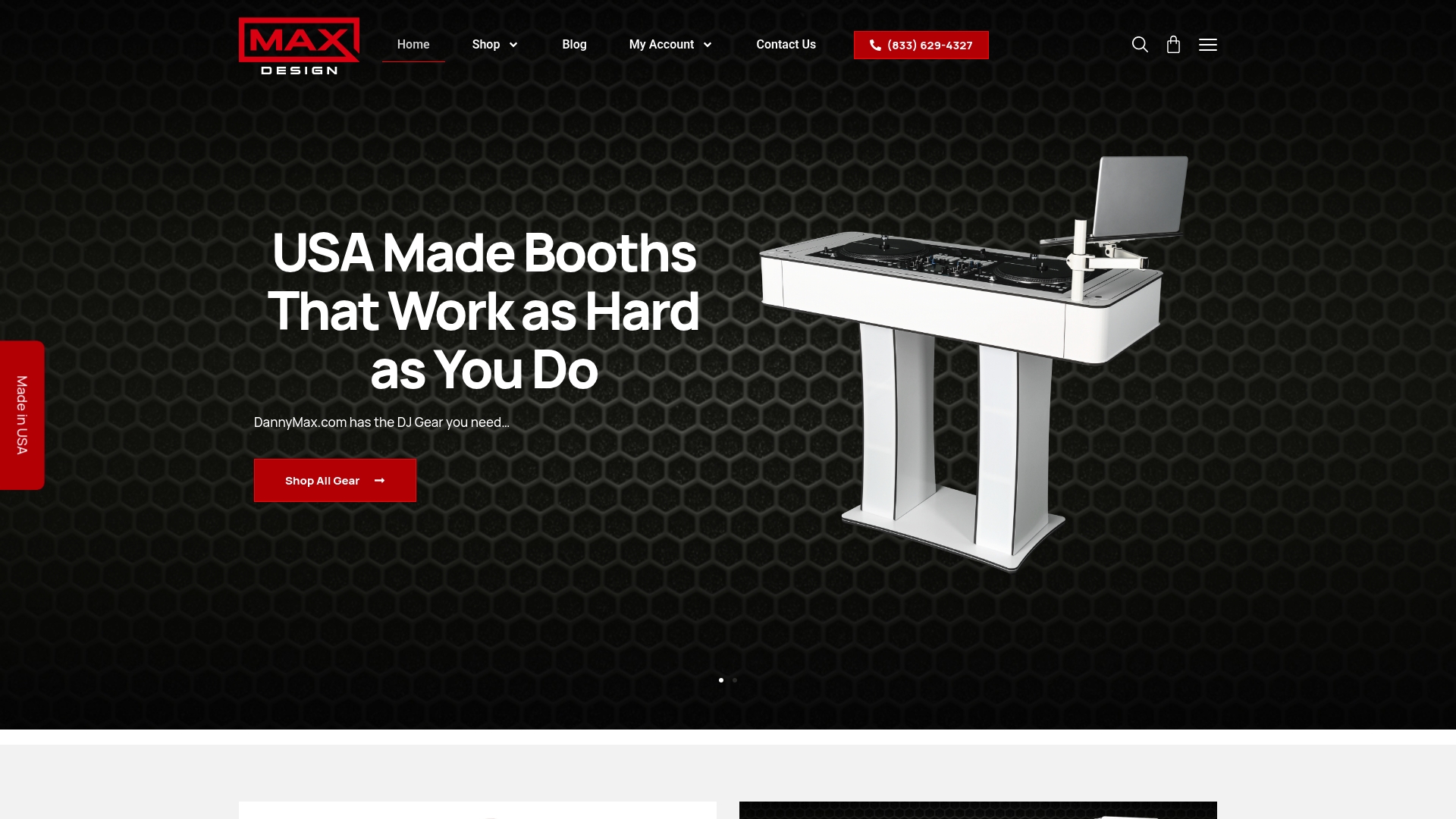
Take the guesswork out of your decision. Visit MAX Design to browse premium DJ consoles and accessories trusted by top performers. Explore detailed product information, customer insights, and solutions built to fit every performance scenario. The right console is waiting and now is the perfect time to elevate your setup.
Consider your performance environment, musical genre, budget, technical proficiency, and your short and long-term professional goals when selecting a DJ console.
Create a comparison matrix that includes important specifications such as channel count, connectivity options, audio resolution, and software compatibility to evaluate different consoles effectively.
Testing a DJ console allows you to evaluate its usability, performance, and how well it fits with your personal style in real-world scenarios, ensuring it meets your creative and technical requirements.
Always verify that the DJ console integrates seamlessly with your existing DJ software, computer systems, and any additional audio equipment you plan to use before making your purchase.


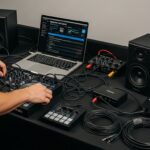
![]() Our product is made right here in Newark, Delaware U.S.A.
Our product is made right here in Newark, Delaware U.S.A.